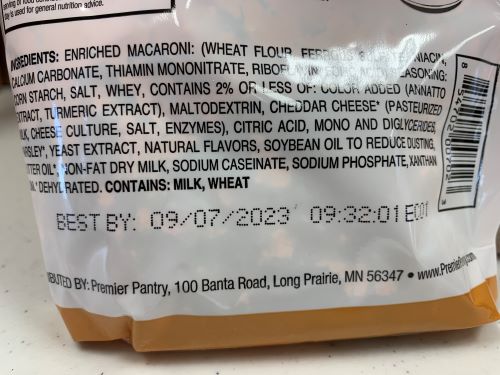Food Waste Week - What Do Those Dates Mean?!
Do you wonder if those "Best by" dates are really important? Can you eat food that is past the "use by" date?
Food Waste Week - What Do Those Dates Mean?!
by Katie Cullum
If you go grocery shopping and come out with three full bags, would you get home and throw one of those bags in the trash? Probably not! But that's what happens when we waste food. We may not throw it out immediately after we buy it, but it may go in the trash later!
One reason that some people throw food away is confusion about date labeling on the food packages. Consumer uncertainly is responsible for about 20% of food thrown away, according to the FDA. Most date labels are not based on exact science. Manufacturers generally apply date labels for a variety of reasons. The most common reason is to give consumers a general idea for the best quality and flavor. The "Best if used by" dates relate to the quality of the product. BUt the FDA advises consumers to check the product for changes in color, consistency or texture on products that are past the "Best if used by" date. If you see noticeable changes, you may want to avoid eating these.
There are a variety of labels used - “use before,” “sell by,” “expires on” and most of these are related to quality, not safety. What do they mean? According to the FDA:

- A "Best if Used By/Before" date indicates when a product will be of best flavor or quality. It is not a purchase or safety date.
- A "Sell-By" date tells the store how long to display the product for sale for inventory management. It is not a safety date.
- A “Use-By" date is the last date recommended for the use of the product while at peak quality. It is not a safety date except for when used on infant formula as described below.
- A “Freeze-By” date indicates when a product should be frozen to maintain peak quality. It is not a purchase or safety date.
Open dating is found on most foods including meat, poultry, egg and dairy products. You'll want to note these when purchasing. However, meat and poultry are best used (or frozen) with 2 days of purchase. Milk may be good past the date on the carton but it may not depending on how long it's been open, where you keep the milk in the refrigerator, and personal preference. Ideally, you should not store milk in the door of your fridge because it will not stay as cold as the back of the fridge.
"Closed or coded dates" are a series of letters and/or numbers and typically appear on shelf-stable products such as cans and boxes of food. These codes allow manufacturers to to rotate stock and find products in the event of a recall. Can codes may show dates but these dates refer to when it was canned and are not "Best if used by" dates. Cans may also display "open" or calendar dates. Usually these are "Best if Used By" dates for peak quality. Always discard cans that are dented, rusted, or swollen. High-acid canned foods (e.g. tomatoes and fruits) will keep their best quality for 12 to 18 months. Whereas, low-acid canned foods (e.g. meats and vegetables) will keep for two to five years.
However, infant formula is required to have a “Use by” date so that the manufacturer can make sure the product has the best quality with enough nutrients. Infant formula dates are the only dates required by the federal government.
Dates (such as "sell by" or "Expiration" EXP) on eggs are not required by the federal government but some states may require date labels. Some states do not allow a "sell by" date on eggs. Most eggs reach the store just days after the hen lays them. Egg cartons with the USDA Shield have to display the "pack date" (the day that the eggs were washed, graded, and placed in the carton). This number is a three-digit code that represents the consecutive day of the year starting with January 1 as 001 and ending with December 31 as 365. When a "sell-by" date appears on a carton bearing the USDA grade shield, the code date may not exceed 30 days from the date of pack.
When you get your eggs home, be sure to store them correctly. Leave them in their original package and keep in the coldest part of your fridge, not the door.
Now that you know what those dates mean, you may not throw them away unless they are not good (changes in color, texture, etc.). Check your pantry, fridge, and freezer when planning your menus so that you can use things that may be nearing their quality limit. This way, you won't be throwing away good food!
Questions? Concerns? Send me an email or check my Facebook page.
References: